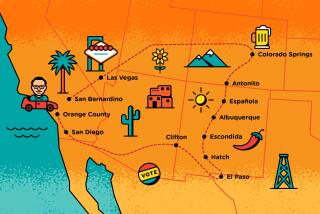Opening for Latino Voting Marred by Dispute Between Cranston, Velasquez’s Heirs
Willie Velasquez was one of the smartest Latino leaders around, but when he died of cancer a couple of months ago, at the age of only 44, the news got more attention in his home state of Texas than in California. That is ironic, because last month Velasquez left this state an important legacy: a court decision that could mark a new era in Latino political power.
But even more sadly ironic is the fact that Velasquez’ effort to expand his efforts into California left his San Antonio-based Southwest Voter Registration and Education Project deep in debt, and the leftover bills are hampering the project’s work here and elsewhere.
Velasquez had been the executive director of the Southwest project since it was founded in 1974. But his days as an activist went back to the late 1960s when he helped build the United Farm Workers Union. He then joined La Raza Unida, an effort to create a Chicano political party that briefly shook up south Texas in the early ‘70s. The experience taught Velasquez that Latino political progress was most likely to occur if local issues were used as the focus of organizing efforts--mundane problems, like street paving and better drainage, that were handled by city and county governments or school boards.
So he founded the Southwest project and, for the next 6 years, focused on getting Latinos in Texas to vote, and making sure their votes were effective. The first he did by conducting hundreds of voter registration drives. The second through dozens of lawsuits challenging poll taxes, gerrymandering and, especially, Texas’ practice of allowing municipalities to elect officials on an at-large basis rather than by districts.
Velasquez was convinced that the at-large system worked against Latino candidates who got votes in barrio precincts, but lost citywide races because of poor support in Anglo areas. Southwest project attorneys eventually convinced federal courts that the at-large system was discriminatory, and forced almost every city in Texas, including Houston and Dallas, to switch to districts for local elections. As a result, many Latinos and blacks have been elected to local office in Texas since 1980, including San Antonio Mayor Henry Cisneros.
The important gift that Velasquez posthumously left California Latinos was a similar lawsuit against the city of Watsonville, in Santa Cruz County. On July 27 the U.S. 9th Circuit Court of Appeals ruled that California’s at-large system is also discriminatory against Latinos and ordered Watsonville to eliminate it. The decision can now be used as a precedent for Latinos to fight similar election systems in more than 400 cities throughout this state.
But if California Latinos follow up on the Watsonville decision, as they should, they may have to do it without the help of the Southwest project, which is in danger of going broke because of the financial burden caused by its expansion into California.
That happened because Velasquez’ efforts here, as elsewhere, included dozens of costly voter-registration campaigns. They were undertaken with the encouragement of U.S. Sen. Alan Cranston, a Democrat, who promised to help raise money for Southwest project operations here.
Project officials say that Cranston let them down. He helped raise $100,000 for the project rather than the $250,000 they had hoped for. Worse, he helped set up his own voter-registration effort in 1986, called the Campaign for Participation in Democracy, which has drawn potential financial support away from the Southwest project. This year, for example, CPD has a budget of $3.1 million while the Southwest project faces a deficit of $350,000 in its operating budget of $1 million.
Not surprisingly, this turn of events has created some tension between Cranston and the Chicanos who worked with Velasquez in California. For his part, the senator says the situation is the result of “a misunderstanding,” and he praised Valasquez as “a great man who I greatly admired.”
I don’t doubt the sincerity of Cranston’s words of praise for Velasquez, or the sincerity of his desire to see Latinos register to vote. After all, Latinos tend to vote heavily Democratic, which helps candidates like Cranston.
But I am troubled by Cranston’s decision to start his own voter-registration group. The goal is admirable, but Cranston and his aides may have undermined the Southwest project, however inadvertently. And there is a subtle but important difference between the two approaches: Cranston, like any politician, just wants to get out his voters; the Southwest project does that, but it also works for something more--the long-term empowerment of Latinos.
Anglos rarely notice it, but there is a not-always-friendly rivalry between Latinos from California and Texas. Although I’m a native Californian, I have always thought Tejanos were a bit tougher politically, probably because the discrimination they faced in Texas was more overt than in laid-back California. Now we Californians can do something for the Tejanos. We must urge our senior senator to use his considerable clout and fund-raising skills to preserve an important resource for Latinos not just in Texas, but throughout the Southwest.
More to Read
Get the L.A. Times Politics newsletter
Deeply reported insights into legislation, politics and policy from Sacramento, Washington and beyond. In your inbox three times per week.
You may occasionally receive promotional content from the Los Angeles Times.










